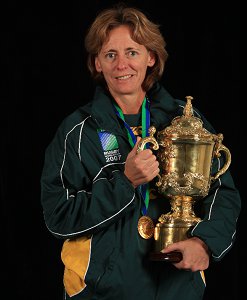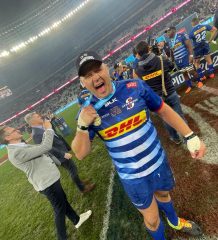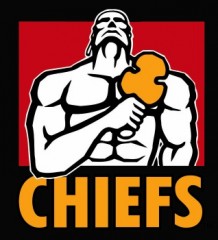Calder eyes even more success

Sherylle Calder showing Bryan Habana the ropes. (c) www.drsheryllecalder.com
Here’s a question for budding sporting buffs in South Africa. Os du Randt aside, which other South African has tasted success at two Rugby World Cup tournaments?
Okay, here’s a clue; firstly, she’s a she – and not a he – and, secondly, she is the only person in the world to have claimed back-to-back RWC titles… Her name, of course, is Sherylle Calder, herself a former sporting international – but, currently, a worldwide pioneer in the game of ‘eye coaching’.
“Eye coaching?” you might be half-saying aloud. Yes, eye coaching…
“In simple, simple terms,” explains Calder, “I am a fitness trainer for the eyes.
“Remember, your eyes are also a muscle and they also need regular training in order to get stronger and better. At the same time, however, whilst I am a fitness trainer for the eyes, it’s not the eyes alone; but also the brain and your motor responses that thereby require work.
“So, what you see, and how you process that and then respond – that is what we work on and it involves everything you do on the field; from skills right through to decision-making.”
The common mistake that people make, according to Calder, is to compare her to an optometrist, but she adds: “There is visual therapy (done by optometrists), but that is not what I do. I am not an optom, I’m a sports scientist because I believe, irrespective of your eye-sight, I can improve your skills
“As a child, I always challenged myself to see the bigger picture… to me it was normal and I always presumed that all kids were like that!
“When I played hockey for South Africa, I wasn’t happy just staying here and playing against the same opposition all the time, so in the off-seasons (during isolation) I went overseas five times to play there.
“People always used to say to me, ‘Have you got eyes in the back of your head?’. I just presumed everyone saw what I could see, but then I realised that it wasn’t like that and I had something different.
“I stopped playing international hockey in 1996 to pursue what was inside me, and which I thought was special, as I wanted to find out why.
“Of course, in no work can you go out there and train with top sportsmen without researching it properly, or at least that’s what I believe,” explains Sherylle. “If it was research-based and it worked for me, then I knew, if applied correctly for other people, it would work too. I just started writing up what was in my head and put it into a research project and then proved it.”
Well, she has more than just “proved it”.
Calder – who played over 50 hockey internationals for South Africa – has achieved a lot of her success in the rugby world, in particular, and South Africans will no doubt recognise her from watching the Springboks at the 2007 World Cup.
“So many things break down in a rugby match because of bad skills,” she says. “Unfortunately, you don’t have enough time in rugby to train enough skills, so the best way to deal with this is to train your eyes.”
Of course, being part of the Bok World Cup triumph in France in 2007 was Sherylle’s second taste of World Cup glory; her first RWC ‘triumph’ having come in 2003 when she was part of Clive Woodward’s England squad.
“I’ve been called a lot of things,” she says with a grin when asked about working for one of SA’s biggest sporting rivals. “But if I cared about what people said or thought I’d be nowhere right now.”
But how did Sherylle find her way into the ‘enemy’s – England’s – camp’?
“It’s quite funny really,” she explains. “Clive (Woodward) had actually heard about me because of the work I had done with the All Blacks.
“He asked me to go over to England for a week and to give some presentations. I flew over on the Sunday night, I did a presentation to the 30-odd players and the management team on the Monday morning and I did some work with the backline in the afternoon.
“That evening,” she continues, “Clive came to me and told me to go back to SA and to pack my bag properly – they wanted me to work for them!”
Her time with England and the Springboks aside, the rest of Sherylle’s CV reads like a ‘Who’s Who’ of world sport.
She worked with Australia’s 2003 Cricket World Cup squad, as well as the Pakistani cricket team before that. She is in Canada this week where she is working with an ice-hockey team, whilst she also consults for an Aussie Rules team, as well as having worked with Team Prada in the America’s Cup and also cricket umpires Simon Taufel and Billy Bowden.
“To be absolutely honest, I’ve lost count of all the teams and people I have worked with – I’d have to check my computer to remember everyone,” she says modestly, although her office wall is a timely reminder; with pictures of World Cup trophies, Jake White, Bowden, the SA Davis Cup tennis team – to name just a few – hard to ignore.
“I’m a South African and a proud one at that, and my heart will always be here, but I’ve been travelling abroad since my hockey days and I think part of my success has been from learning from experience, a lot of which I have picked up from playing sport and working abroad. I always want to learn and my eyes see a lot, too.
“A large part of what I do is not just about vision but also the experience of working with elite teams – it’s about experience, many of which I’ve picked up through all my years of work and travel.”
Calder is a qualified Sports Scientist and her journey began many years ago in Bloemfontein – where she was born, schooled and first attended university – to Stellenbosch (post-grad) and, finally, to the University of Cape Town where she obtained her PhD.
“I came into contact with Tim Noakes at UCT,” she reveals, “and I did my PhD under him.
“Tim always said to me, ‘I will teach you about research, you teach me about vision’. We’ve always had a great understanding since I joined the Sports Science Institute here in Cape Town.”
Despite her obvious success in the sporting world – at various levels and with numerous codes – Calder is at pains to explain that her work would also flourish in the academic world; much like successful sporting teams are able to build similar business plans to profitable business organisations – and vice versa.
“I spent last year working in London, with British Olympics, and that’s when I made the decision to come home and attempt to make a difference in some kids’ lives,” says Sherylle, who in the past six months has been to Bethlehem, Windhoek and Paarl – to name just a few – in order to do some work with South African schoolkids.
“I have no doubt that my work can make a positive impact on learning skills. When I was in the UK last year, I did a research project on 60 kids – all of whom came from different performance levels and some who had behavioural and/or attention problems.
“We examined all the kids via a cognitive test, put them on a programme and re-rested them after six weeks… Although I’m still writing this up, already one could see an improvement amongst the children.
“I have also developed programmes, some of which are not that in-depth and focus, instead, on core skills and hopefully we can make a difference here when it comes to the children.”
The beauty of Sherylle’s job is that her office – as she puts it – “is my laptop and the world”, although it does mean that she hardly seems to take any proper time off.
“I actually wish I had an ‘off switch’ because my eyes are looking for things all the time; even on a Saturday when I’m sitting at home watching sport and trying to relax!
“A lot of the time, just from watching people on TV, I can pick up things and a lot of the time those errors I can spot are simply down to the players’ eyes.
“Mistiming the ball is a common error in sport… People assume that mistiming in sport is down to bad skills; mistiming is down to your eyes. It’s really logical, simple stuff that I do, but it makes a huge difference.”
One could chat to Sherylle Calder for hours and hours. She says people have offered to write books for her – either about her or with her – and she reckons she could tell a few good stories. Although, she quickly asks with a huge smile, “But who would buy my book?”.
“Sometimes,” she says, pausing briefly, “I don’t have enough hours in the day.
“But I’m a pioneer and even though I’ve had to prove myself to many, and I also find people trying to copy my work – or pass it off as theirs – without coming to me first; I would never be doing this if I didn’t love it.”
The good news is that Calder will continue to reach new frontiers with her unique work and insight – only it’s not just the likes of Jonny Wilkinson and Bryan Habana that will be benefiting from it. Anybody can. Sure, it’s hard work, but one gets the feeling that she would not want it any other way.
By Howard Kahn
* To find out more about Sherylle Calder’s work, visit her website: www.drsheryllecalder.com
Related Posts
« Training the eyes that are on the prize French Top 14: Round 1 »
















